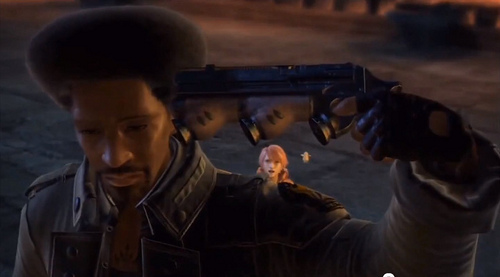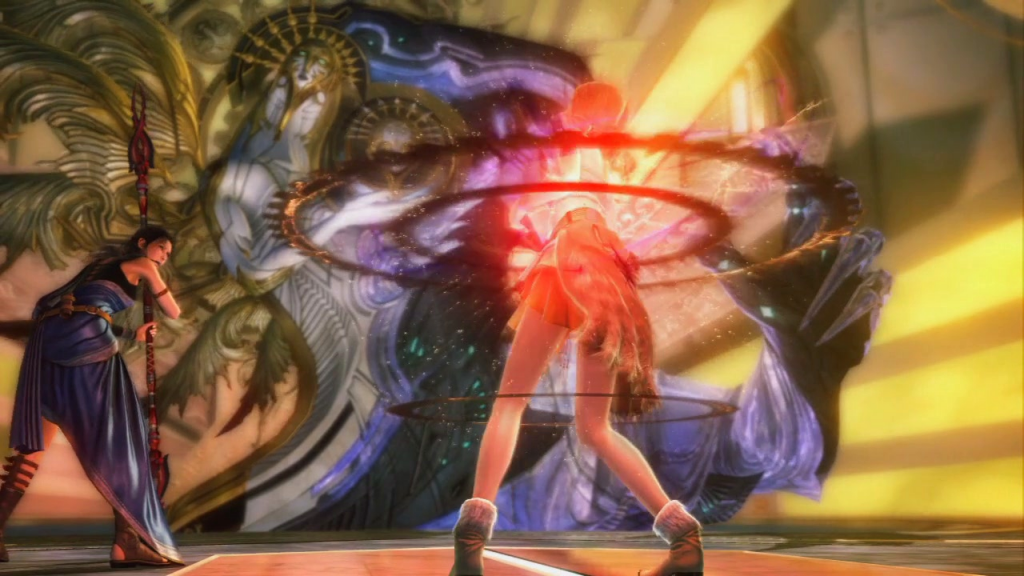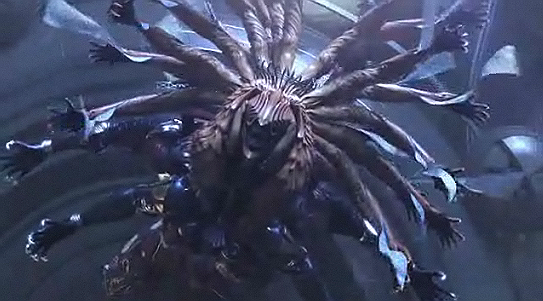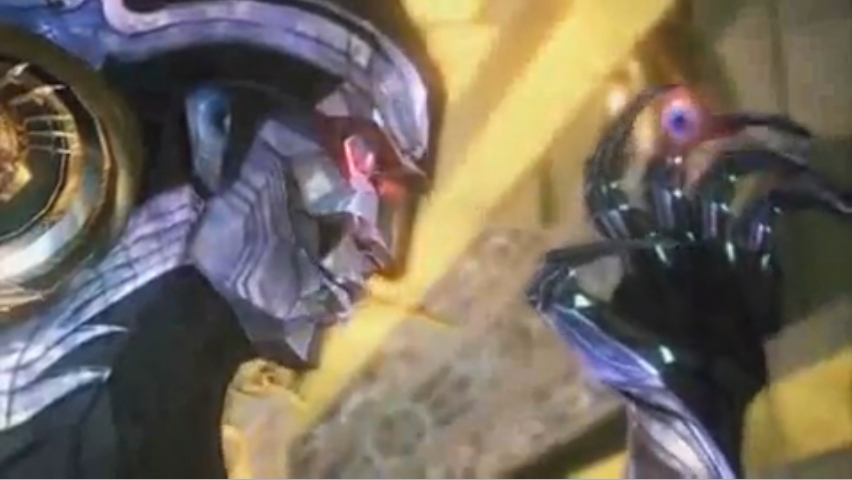Please welcome yet another guest contributor, Yann Wong. Yann writes on his own blog Redeemed Gamer, which focuses on video games and their theological themes (hey!). In his own words:
This blog is written primarily for folks who consider themselves to be both gamers as well as serious evangelical Christians. I suspect there are plenty of such folks around (and not just in America), but much like myself, we’ve been pretty shy to admit we’re gamers when we’re in Christian company and likewise admit we’re Christian when we’re in gaming company. Probably, most of us had struggled with whether video games are sinful and contemplated whether we should just quit gaming altogether. Possibly, many of us struggle a good deal with video game addiction. I do intend to share thoughts on some of these issues in this blog, but primarily this blog aims to encourage and edify fellow Christian gamers, and to help use our fellow experiences as gamers to point each other towards Christ.
Mr. Wong’s work comes from a unique place (must be all that teaching of High School physics), and his writing (from my perspective) mixes deep theological issues with all sorts of different video games. It’s a great deal different than what I do here, but it’s great material, and I implore you to check it out! Here’s hoping he writes more stuff like his exhaustive examination of Eternal Sonata. Oh, hey, here it is!
———————————————————————————————————————————————————————————————————————–
NOTE: Obvious spoilers for Final Fantasy XIII, if you couldn’t have guessed.
“Despair, despair, and save us all! “
– Orphan, in response to Fang turning into Ragnarok
It’s hard to figure out why I didn’t enjoy FF XIII. Sure, it was linear, and some of the characters weren’t likeable, but these two reasons alone wouldn’t be sufficient reason for my discomfort with FF XIII. Not to mention that I generally agree that FF XIII was nuanced with their treatment of characters, had very elegant game mechanics, and has quite possibly the most beautiful graphics of any game I’ve ever played (still true today). Yet why did playing FF XIII made me feel so unhappy? Then I realized why – FF XIII was a game which was too intimate with despair. The prolonged journey of hopelessness, stretched out over 50 hours, started to eat me at my soul.
A JRPG isn’t where you expect to find “dark and gritty”. And though that wasn’t it’s primarily aesthetic design, that was the treatment the characters got from their circumstances. Lightning was orphaned when she was 15, leaving her to raise Serah on her own. On her 21st birthday, Lightning refuses to believe Serah about her being branded a l’Cie, Serah runs away, and by the time Lightning saw Serah again, Serah was already turning into crystal. Sazh’s wife died, leaving him with a 3 year-old Dajh to raise. 3 years later, upon his son’s request, Sazh brought Dajh to see a fal’Cie, only to have the fal’Cie brand Dajh as a l’Cie, dooming Dajh to either be a crystal or a Cie’th. He then sees Dajh taken away from him by PSICOM to be used as a tool of hunting down Pulse l’Cie, including using Dajh to hunt Sazh himself, who had then become a Pulse l’Cie. When he finally sees Dajh again, his son turned into crystal before his own eyes. Hope is a 14 year old child who has an estranged relationship with his father. While on a vacation with his mother (his father was too busy with work to join them), they got quarantined and forced to board a Purge train. The train was derailed by Snow and NORA, only to see his mother support Snow’s resistance, and die in the process. For much of the game, Hope is banded together with the person he blames for his mother’s death, whom he plots to take revenge by killing him. And that’s before we go into the heart-wrenching stories of Vanille and Fang.

Throughout the story of FF XIII, it seems that almost each time the protagonists made progress, they were reminded of how hopeless their situation was. They successfully infiltrated the Pulse Vestige only to see Serah turn to crystal before their eyes. They defeat Anima in battle, only to be branded l’Cie. They survive the crashing of the Vestige into Lake Bresha, but fail to band together and split into separate parties due to their differences. With the help of Calvary, Sazh and Vanille are successfully rescued, only to find out from Galenth Dysley that their focus was to destroy Cocoon by making it crash into Gran Pulse. They survive the battle with Barthandelus, only to find out from Cid Raines that they were manipulated by Barthandelus all along. They reach Oerba, but instead of finding out more about their focus, they find Barthanedelus trying to deceive them in Serah’s form. They defeat Barthandelus only to find that Cocoon was going to be destroyed even without their intervention. They chase Barthandelus back to Cocoon to try and save Orphan…and actually end up killing him instead.
Perhaps, the ending of FF XIII is the pinnacle of despair. After the merged Barthandelus-Orphan boss was defeated in battle, for some reason it did not die and instead Lightning, Hope, Snow and Sazh were turned into Cie’th. Vanille was tortured until Fang agreed to become Ragnarok to destroy Orphan and Cocoon, while Vanille watches on despair. At this point in time, there could be no logical conclusion to the story which would result in a happy ending. Even if they discovered a new-found ability to kill Orphan, Cocoon will still crash and fall as a result of Orphan’s death. If they don’t kill Orphan, he will continue to torture Fang and/or Vanille until one of them becomes Ragnarok. There is no hope out of this situation. This is despair.

I know something about despair. I was only clinically diagnosed when I was in college, but on retrospect I realized that I’ve been struggling with depression much of my whole life. In my junior year of college I lived in a residence hall which closed when the academic semester ended. That year, I was so depressed that I did not buy a plane ticket home. I was convinced that one way or another I would not live past that summer: either I would take my own life, or I would roam the wilderness and die of starvation when I had to move out of the residence hall. I didn’t want to save myself. I didn’t want to talk to anybody. My friends (including my Christian fellowship) has no idea I was battling depression and just assumed I was locking myself in to study (which, to Asians, isn’t considered an unhealthy occurrence). Much like the situation faced by Lightning and her party members, I was certain there was no hope out of that situation. This was despair.
Unexpectedly, the impossibly hopeless situation at the end of FF XIII was resolved into a happy ending. This was why Austin Yorski accuses the ending of being a shameless deus ex machina and he is right. There is no logic consistent with the story thus far to believe that Lightning, Hope, Snow and Sazh could transform back to their normal selves after turning into Cie’th. There is no reason why the protagonists should want to fight Orphan, knowing full well that killing Orphan would destory Cocoon, and they have no knowledge or ability to save Cocoon when Orphan dies. There is no logic consistent with the story thus far to believe that Fang and Vanille can, as two individuals, become a single benevolent Ragnarok who has the ability to manipulate magma and turn it into crystal and use this ability to save Cocoon. There is no reason to believe Ragnarok would even be a benevolent entity in the first place.

In reality, God sometimes works in situations which from men’s perspective appear to be deus ex machina (after all, he is ‘Deus’). Joseph becoming the right-hand man of Pharaoh. Moses parting of the Red Sea. Daniel surviving the lions. Jonah living in the belly of a fish which spits him out where he needs to be. Christ feeding 5000 hungry people with 5 loaves and 2 fish. All of them illogical, and there was no reason any reader up to that point in time would believe these incidents would happen. This was also how God saved me from my own battle with depression that summer. A friend (whom I have not spoken to in months, nor did she know about my circumstances) came to visit my next-door neighbour one evening. She thought since she was here she should drop by and say hi to me. For some reason that night, I didn’t chase her away. After hearing about my struggles, she called a few friends, and together they helped me to (i) get a plane ticket home, (ii) arrange storage for the stuff I’m not bringing back home, (iii) arrange a schedule of friends to keep me company everyday until the semester ended and (iv) speak to my profs on my behalf to plead for leniency in my grades. Totally illogical. The story wasn’t supposed to end that way.
Surely goodness and mercy shall follow me all the days of my life, and I shall dwell in the house of the LORD forever.
(Psalm 23:6 ESV)
That summer I learned that God is not just someone who demands me to love Him and passively sits there, but He is the one who takes the initiative to pursue me, to protect me and to draw me back to Him, even though I am utterly undeserving of all of it. In Psalm 23:6, the psalmist proclaims that “surely goodness and mercy shall follow me all the days of my life”. The word ‘follow’ is translated from the Hebrew word radaph, which doesn’t just mean “to follow behind”, but also means ‘to pursue’, ‘to chase’, ‘to run after’, or even ‘to persecute’. This describes the zeal of God’s love for us, and how much He continues to pursue us even though we stray, and even though we are undeserving of his love.
And this is how undeserving we are – we were enemies of God, sinners and heathen before the perfectly holy God. The natural logical ending of the story is that when we meet God in heaven, He will expose us for all our depravity, and we will suffer our judgement and eternal punishment. This was the only logical conclusion. There was no hope out of this situation. This was despair. But this was not the ending that God planned. The biggest proof of how much God loves us, and how much he pursues us is this: that he would send his son Jesus Christ to die on the cross for our sins, so that we might be reconciled to Him. This was the biggest deus ex machina ever written. The most illogical ending to it all. But this is also the most important truth in the world.
And can it be that I should gain
An interest in the Savior’s blood?
Died He for me, who caused His pain—
For me, who Him to death pursued?
Amazing love! How can it be,
That Thou, my God, shouldst die for me?

